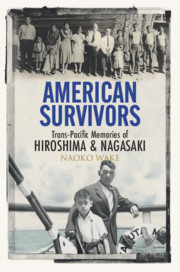Book contents
- American Survivors
- American Survivors
- Copyright page
- Dedication
- Contents
- Figures
- Abbreviations
- Notes on the Text
- Acknowledgments
- Introduction
- 1 Cities of Immigrants
- 2 Remembering the Nuclear Holocaust
- 3 Reconnecting Families
- 4 War and Work Across the Pacific
- 5 Finding Survivorhood
- 6 Endlessness of Radiation Illness
- Epilogue
- Notes
- Glossary
- Select Bibliography
- Index
- American Survivors
- American Survivors
- Copyright page
- Dedication
- Contents
- Figures
- Abbreviations
- Notes on the Text
- Acknowledgments
- Introduction
- 1 Cities of Immigrants
- 2 Remembering the Nuclear Holocaust
- 3 Reconnecting Families
- 4 War and Work Across the Pacific
- 5 Finding Survivorhood
- 6 Endlessness of Radiation Illness
- Epilogue
- Notes
- Glossary
- Select Bibliography
- Index
Summary
The Epilogue traces the decline of US survivors’ civil rights activism in the US and the increased trans-Pacific collaboration among American, Korean, Japanese survivors aimed at obtaining compensation from the Japanese government. This development, based on the era‘s notion of human rights, was shaped by the precedents set by Korean survivors. By the turn of the twenty-first century, Korean survivors successfully sued the Japanese government for its failure to treat Korean survivors fairly. As victims of the Japanese wartime empire, Koreans carried more leverage than Americans when they confronted the Japanese government. Japanese survivors, too, urged their government to extend benefits to non-Japanese survivors. As more survivors came together, both the US and Japanese governments exhibited a tenacious refusal to recognize the bombs‘ human cost. Ultimately, US survivors’ history shows how nation-states’ failure to grasp the nuclear injury continues to shape historical understanding, suppressing along the way the voices of people who have long been bridging the nations. Built on this failure is the misguided policy of nuclear buildup in the name of national security.
Keywords
- Type
- Chapter
- Information
- American SurvivorsTrans-Pacific Memories of Hiroshima and Nagasaki, pp. 313 - 328Publisher: Cambridge University PressPrint publication year: 2021



